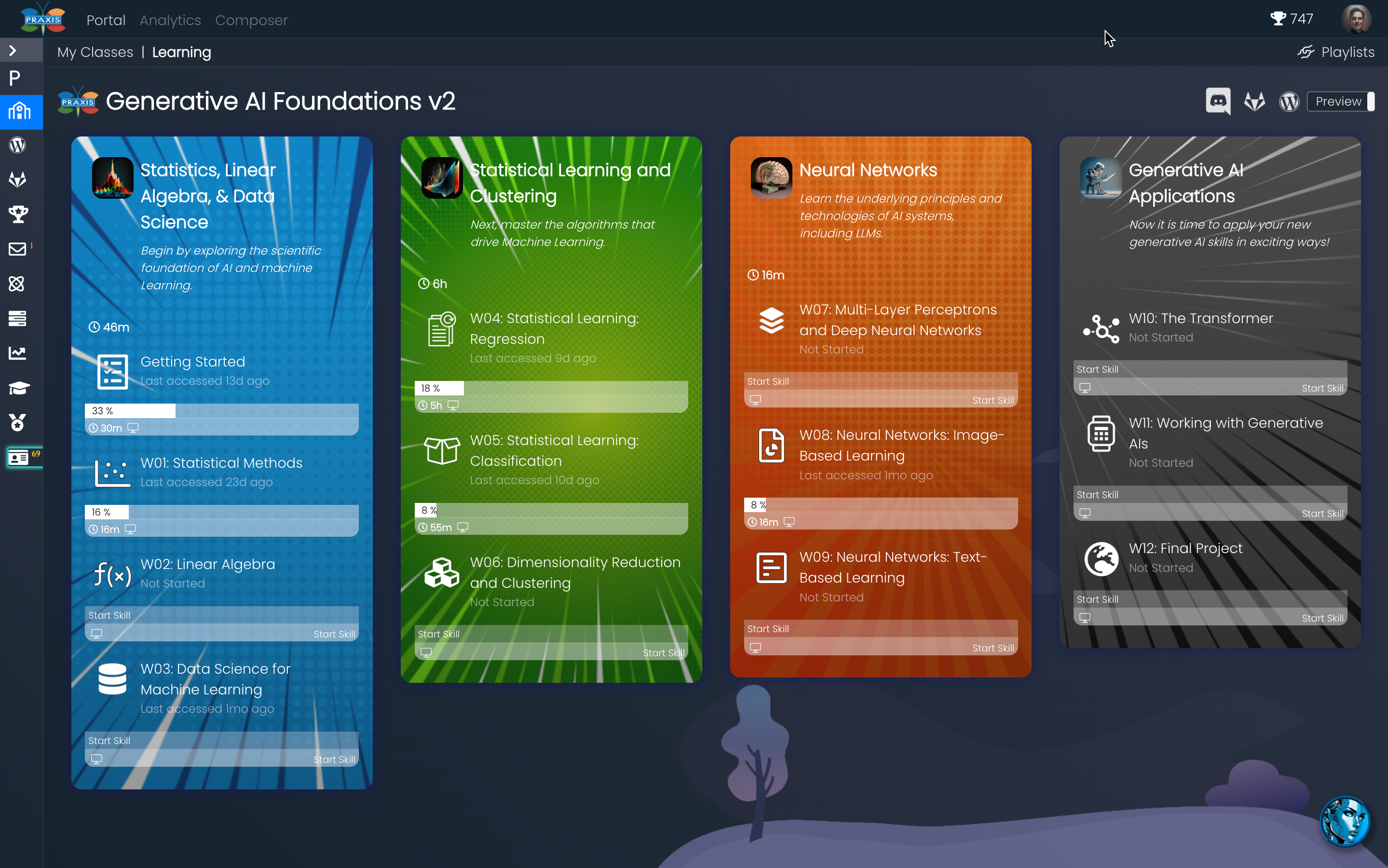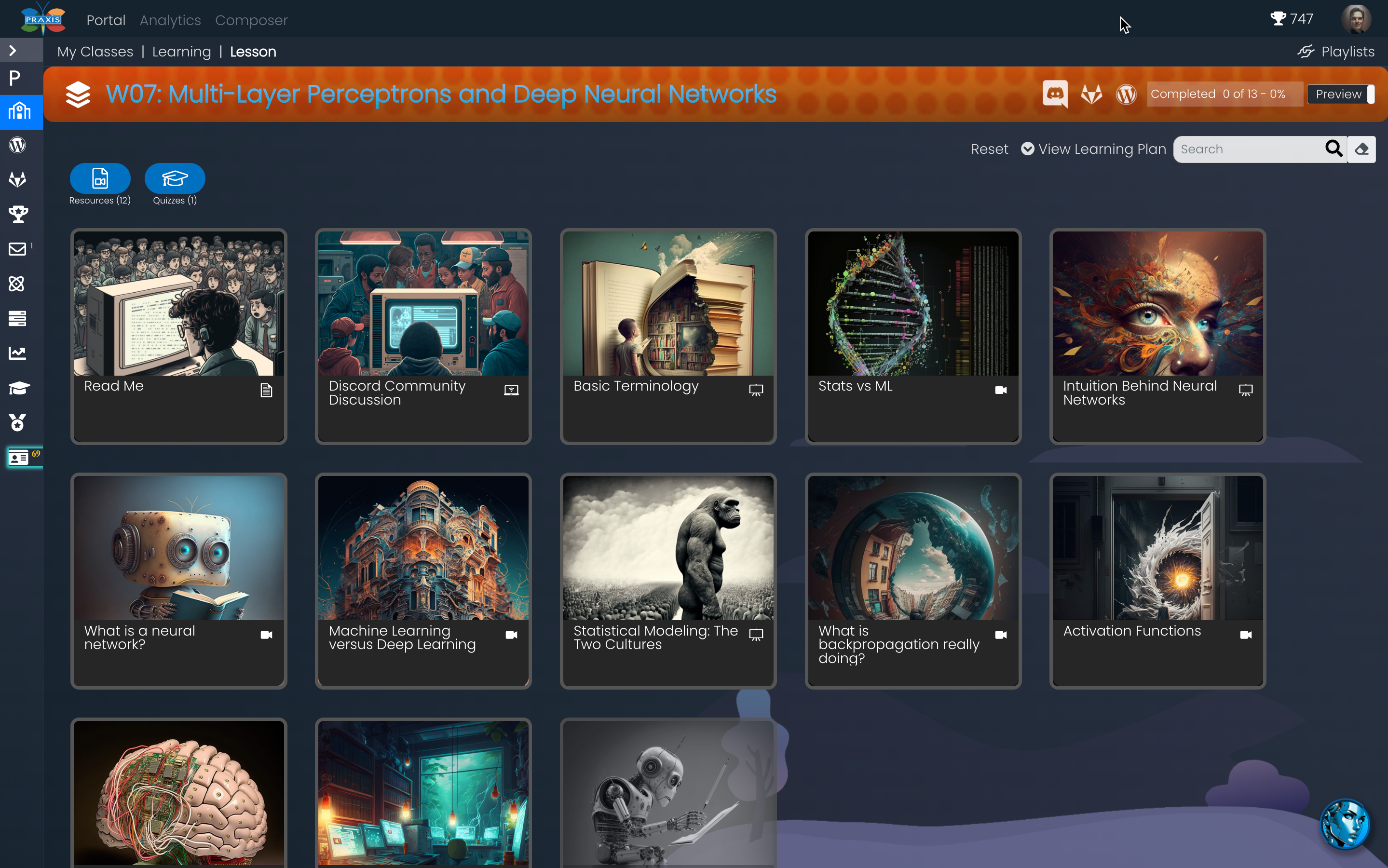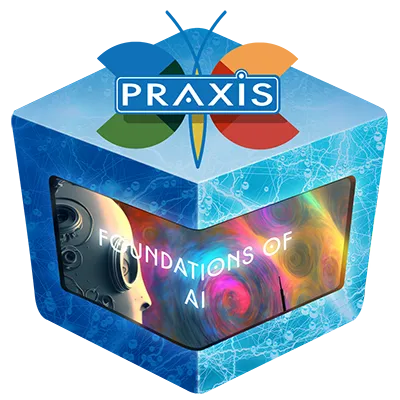Generative AI Foundations
An introduction to the fundamentals of AI and the cutting-edge tech that is rapidly changing our world. Students will collaborate with each other, mentors, and Ask Stinger in an online AI Lab. In the final project, they will build their own large language model using the skills and coding expertise they developed throughout the course. Qualifies for the Foundations of AI digital badge.

Course Details
The Praxis Foundations of AI journey – featuring AI-expert Reed Bender – guides students through a cutting-edge collection of resources and labs designed to equip them with the skills and tools necessary to understand both the mathematics underlying machine learning and the revolutionary applications being built today.
The journey starts with a foundational understanding of statistics, linear algebra, and data science. From there, the students will be guided through best-in-class content to learn tools such as linear regression, classification algorithms, and neural networks. The course ends with a capstone project exploring generative AI, teaching students how to build and implement their own AI powered chatbot. Throughout all of this, students will be taught to interactively write Python code to implement the algorithms they are exploring.
Students will explore the fundamentals of AI and the cutting-edge tech that is rapidly changing our world. They will collaborate with each other, mentors, and Ask Stinger in an online AI Lab. In the final project, students will build their own large language model using the skills and coding expertise they developed throughout the course. Qualifies for the Foundations of AI digital badge.
Journey Architecture

The online program is available 24x7x365 via any web browser or mobile device and includes four (4) learning paths, thirteen (13) lessons, and over fifty (50) hours of learning material. Below is a list of the main topics:
●
Water: Statistics, Linear Algebra, & Data Science
●
LearEarth: Statistical Learning and Clustering
●
Air: Neural Networks
●
Fire: Generative AI and Practical Applications
The learning paths have been organized into fundamental elements that coordinate the stages of learning. The first Learning Path, Water, gives students the foundational understanding necessary to progress in AI development. Students learn statistics, linear algebra, and data science techniques that are universal tools in Machine Learning. This is the root of information that AI technologies emerge from. The second Learning Path, Earth, takes each of these concepts and applies them to the most basic tools in machine learning that are crucial to understand. Students are led through interactive Python code, in which they are taught how to perform linear and logistic regression, K-nearest neighbors classification, principal component analysis (PCA), and dimensionality reduction techniques such as autoencoding.
The third Learning Path, Air, is dedicated to the ideas underlying the more advanced AI systems today such as neural networks and large language models. Finally, in the fourth Learning Path, Fire, students aggregate all of this knowledge to perform time-series analyses and create advanced generative AI models. This equips the students with a deep understanding of the mathematics and theory which underlie groundbreaking tech like ChatGPT in today’s world.
Skills and Resources
●
Statistical hypothesis testing
●
Exploratory data analysis (EDA)
●
Linear regression
●
K-nearest neighbor classification
●
Model evaluation and hypertuning
●
Natural language processing (NLP)
●
Generative AI and the transformer model
●
Engagement with generative AI
●
WritingData visualization in Python
●
Feature engineering and dataset curation
●
Decision tree classification
●
Multi-layer perceptrons and deep neural networks
●
Convolutional neural nets for image classification
●
Using APIs to access open-source AI models
●
Creating vector embeddings of data with OpenAI
●
Linear algebra for machine learning

Digital Credential

Earners of the Foundations of AI credential have successfully demonstrated experiential skills in data science, statistical learning, clustering, neural networks, generative AI and practical AI applications. The Foundations of AI badge requires 50+ hours of hands-on activities and labs across 16 skills that make up a foundational understanding of artificial intelligence for both research and industry applications. The Foundations of AI credential was built in collaboration with AI expert Reed Bender.
Following is summary of the earning criteria for the Foundations of AI digital credential:
●
Complete 12 hands-on AI labs using Python programming, Jupyter Notebooks, and live computing systems
●
AND – Complete all required learning resources in the Foundations of AI online journey – 12 lessons – including, videos, articles, activities, and discussion posts
●
AND – Pass short assessments (80% or better) in all lessons
●
AND – Participate in weekly virtual collaboration sessions with instructor(s), mentor(s), and peers